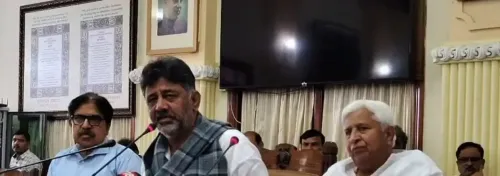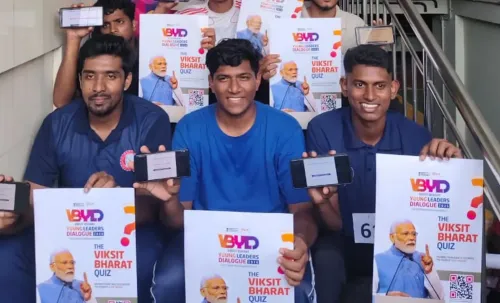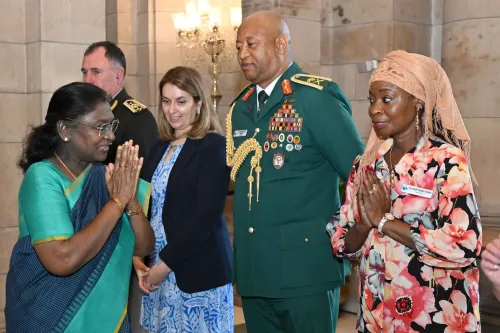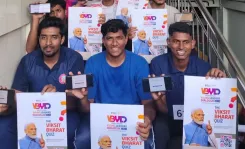What Bold Extradition Strategy Did HM Amit Shah Unveil at CBI Summit?
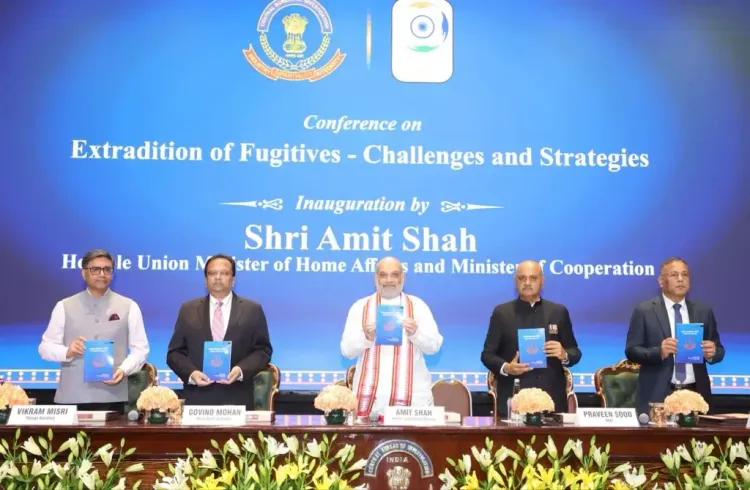
Synopsis
Key Takeaways
- A comprehensive extradition strategy aimed at enhancing international cooperation.
- Significant legislative reforms such as the Fugitive Economic Offenders Act.
- The need for state-level units for effective fugitive repatriation.
- Emphasis on technological advancements in law enforcement.
- Strengthening of national security through collaborative efforts.
New Delhi, Oct 16 (NationPress) Union Home Minister and Minister of Cooperation, Amit Shah, delivered a compelling speech at the Central Bureau of Investigation (CBI) conference titled “Extradition of Fugitives: Challenges and Strategies” in New Delhi on Thursday, reinforcing India’s unwavering determination to bring fugitive criminals to justice.
Shah highlighted that, under Prime Minister Narendra Modi’s leadership, India is strengthening its national security and upholding the rule of law.
“The challenge of fugitive criminals is intertwined with the nation’s sovereignty, economic stability, and law enforcement, and is critical to national security,” he remarked.
He underlined the necessity to eradicate the perception among fugitives that they are untouchable by Indian law, asserting, “We cannot ensure the safety of our nation until those who jeopardize our economy, sovereignty, and security from abroad are made to respect the Indian judicial system.”
The Home Minister presented a comprehensive strategy for extradition, focusing on both intent and implementation. The goals include ensuring justice crosses borders, enhancing national security via cutting-edge identification technologies, boosting India’s global judicial reputation, safeguarding the economic framework, and advocating the rule of law on an international scale.
To realize this vision, HM Shah called for effective communication, strategic collaboration, and organized execution. He commended the CBI’s initiative in establishing a dedicated Global Operation Centre, which collaborates in real-time with international law enforcement to capture fugitives.
Remarkably, from January to September 2025, the CBI issued over 189 Red Corner Notices, marking a historic high, reflecting intensified efforts under initiatives such as ‘Operation Trishul’ and the newly instituted BHARATPOL.
HM Shah pointed out significant legislative advancements under the Modi administration, including the Fugitive Economic Offenders Act of 2018, which has facilitated the recovery of nearly $2 billion in assets over four years.
Furthermore, the Money Laundering Act has been reinforced, leading to assets worth $12 billion being attached between 2014 and 2023. The introduction of three new criminal laws, replacing colonial-era regulations, signifies a monumental reform.
Sections 355 and 356 of the Bharatiya Nagrik Suraksha Sanhita (BNSS) now permit trials in absentia, allowing courts to proceed against fugitives by appointing legal representatives, thus altering their status under international law.
To enhance extradition initiatives, HM Shah urged every state to create specialized units dedicated to the repatriation of fugitives, emphasizing a “Whole of Government” strategy.
He proposed the formation of Expert Special Cells within state police to prepare robust extradition cases and recommended establishing specialized prisons that meet international standards for fugitives.
Additionally, he called for a dedicated CBI division to evaluate extradition requests and a special task force under the Multi-Agency Centre (MAC) to improve coordination on issues related to narcotics, terrorism, and financial crimes.
The two-day conference, attended by notable dignitaries including the Union Home Secretary, Foreign Secretary, Director of the Intelligence Bureau, and CBI Director, concentrated on enhancing international cooperation to deal with fugitives involved in economic, cyber, terrorist, and organized crimes.
Seven sessions were held during the conference, addressing essential subjects such as cyber technology, financial crimes, tracing illicit funds, simplifying extradition processes, and utilizing international police collaboration.
HM Shah emphasized that these discussions would bolster national security and economic growth by overcoming policy complexities. He also suggested integrating fugitive databases across state and central agencies, with the CBI overseeing a unified approach.
A special initiative to convert Blue Corner Notices into Red Corner Notices was proposed to accelerate global actions against fugitives. During the event, HM Shah awarded medals for distinguished and meritorious service to CBI officers, acknowledging their contributions to law enforcement.
Awardees included Pramod Kumar, ASP, CBI, ACB, Mumbai, who received the President’s Medal for distinguished service, along with others like Sumedha Dwivedi and Mohammad Suvez Haque for their meritorious service. The Asadharan Aasuchana Kushalata Padak-2023 was awarded to Satyamoorthy T for exemplary intelligence work.
HM Shah’s address signified a transformative shift in India’s strategy towards fugitive extradition, propelled by strong legal frameworks, international partnerships, and technological progress.
By enhancing coordination among state police, central agencies, and global partners, India aims to ensure that no fugitive evades justice, thereby reinforcing its sovereignty and economic security. The conference outlines a path towards a secure, law-abiding India, aligning with Modi’s vision of a justice system that delivers verdicts within a three-year timeframe by 2027.


